情态动词表示推测的用法
- 格式:doc
- 大小:32.50 KB
- 文档页数:2
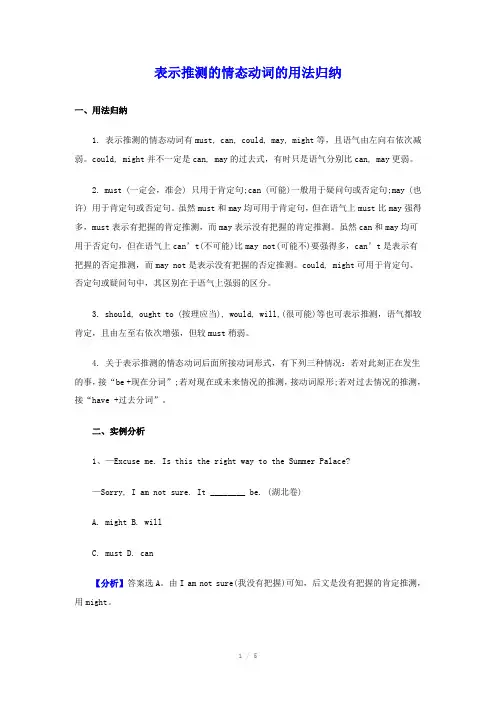
表示推测的情态动词的用法归纳一、用法归纳1. 表示推测的情态动词有must, can, could, may, might等,且语气由左向右依次减弱。
could, might并不一定是can, may的过去式,有时只是语气分别比can, may更弱。
2. must (一定会,准会) 只用于肯定句;can (可能)一般用于疑问句或否定句;may (也许) 用于肯定句或否定句。
虽然must和may均可用于肯定句,但在语气上must比may强得多,must表示有把握的肯定推测,而may表示没有把握的肯定推测。
虽然can和may均可用于否定句,但在语气上can’t(不可能)比may not(可能不)要强得多,can’t是表示有把握的否定推测,而may not是表示没有把握的否定推测。
could, might可用于肯定句、否定句或疑问句中,其区别在于语气上强弱的区分。
3. should, ought to (按理应当), would, will,(很可能)等也可表示推测,语气都较肯定,且由左至右依次增强,但较must稍弱。
4. 关于表示推测的情态动词后面所接动词形式,有下列三种情况:若对此刻正在发生的事,接“be +现在分词”;若对现在或未来情况的推测,接动词原形;若对过去情况的推测,接“have +过去分词”。
二、实例分析1、—Excuse me. Is this the right way to the Summer Palace?—Sorry, I am not sure. It ________ be. (湖北卷)A. mightB. willC. mustD. can【分析】答案选A。
由I am not sure(我没有把握)可知,后文是没有把握的肯定推测,用might。
2、You might just as well tell the manufacturer that male customers ________ not like the design of the furniture. (上海卷)A. mustB. shallC. mayD. need【分析】答案选C。
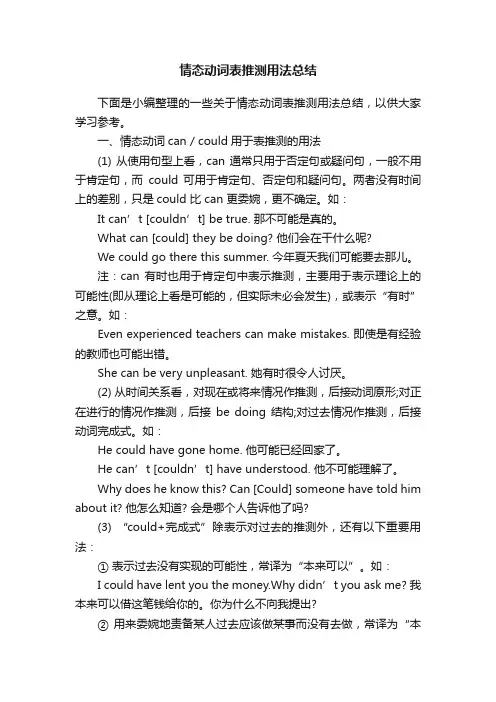
情态动词表推测用法总结下面是小编整理的一些关于情态动词表推测用法总结,以供大家学习参考。
一、情态动词can / could用于表推测的用法(1) 从使用句型上看,can 通常只用于否定句或疑问句,一般不用于肯定句,而could 可用于肯定句、否定句和疑问句。
两者没有时间上的差别,只是could 比 can 更委婉,更不确定。
如:It can’t [couldn’t] be true. 那不可能是真的。
What can [could] they be doing? 他们会在干什么呢?We could go there this summer. 今年夏天我们可能要去那儿。
注:can 有时也用于肯定句中表示推测,主要用于表示理论上的可能性(即从理论上看是可能的,但实际未必会发生),或表示“有时”之意。
如:Even experienced teachers can make mistakes. 即使是有经验的教师也可能出错。
She can be very unpleasant. 她有时很令人讨厌。
(2) 从时间关系看,对现在或将来情况作推测,后接动词原形;对正在进行的情况作推测,后接be doing 结构;对过去情况作推测,后接动词完成式。
如:He could have gone home. 他可能已经回家了。
He can’t [couldn’t] have understood. 他不可能理解了。
Why does he know this? Can [Could] someone have told him about it? 他怎么知道? 会是哪个人告诉他了吗?(3) “could+完成式”除表示对过去的推测外,还有以下重要用法:① 表示过去没有实现的可能性,常译为“本来可以”。
如:I could have lent you the money.Why didn’t you ask me? 我本来可以借这笔钱给你的。
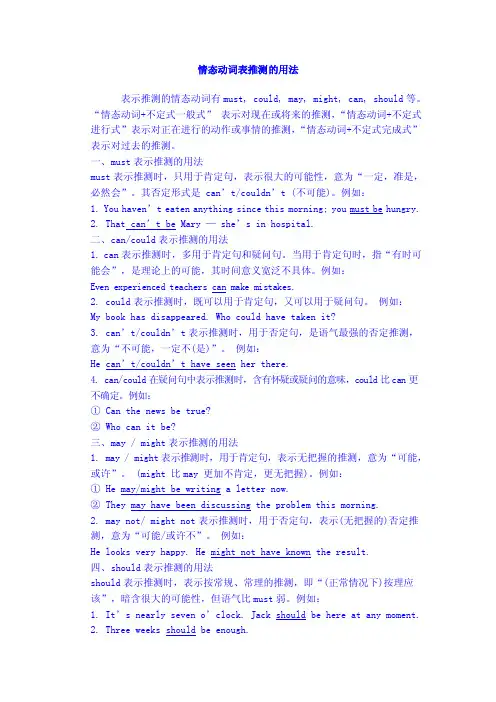
情态动词表推测的用法表示推测的情态动词有must, could, may, might, can, should等。
“情态动词+不定式一般式” 表示对现在或将来的推测,“情态动词+不定式进行式”表示对正在进行的动作或事情的推测,“情态动词+不定式完成式”表示对过去的推测。
一、must表示推测的用法must表示推测时,只用于肯定句,表示很大的可能性,意为“一定,准是,必然会”。
其否定形式是can’t/couldn’t (不可能)。
例如:1. You haven’t eaten anything since this morning; you must be hungry.2. That can’t be Mary —she’s in hospital.二、can/could表示推测的用法1. can表示推测时,多用于肯定句和疑问句。
当用于肯定句时,指“有时可能会”,是理论上的可能,其时间意义宽泛不具体。
例如:Even experienced teachers can make mistakes.2. could表示推测时,既可以用于肯定句,又可以用于疑问句。
例如:My book has disappeared. Who could have taken it?3. can’t/couldn’t表示推测时,用于否定句,是语气最强的否定推测,意为“不可能,一定不(是)”。
例如:He can’t/couldn’t have seen her there.4. can/could在疑问句中表示推测时,含有怀疑或疑问的意味,could比can更不确定。
例如:① Can the news be true?② Who can it be?三、may / might表示推测的用法1. may / might表示推测时,用于肯定句,表示无把握的推测,意为“可能,或许”。
(might 比may 更加不肯定,更无把握)。

情态动词表示推测的用法一,对不同时态的推测情态动词+do sth表示对现在事情的推测。
情态动词+be doing sth表示对正在发生的事情的推测。
情态动词+have done sth表示对过去或已完成的事情的推测。
如:1、They must be in the classroom now.他们现在一定在教室里。
2、The light in the teachers’office is still on. Miss Gao must be working.老师办公室的灯还亮着,高老师肯定正在工作着。
3、Mike may (might) hurt in the traffic accident.迈克可能在这次交通事故中受了伤。
4、He must have finished his homework yesterday.他昨天肯定完成了作业。
二、情态动词表示推测,在不同句型中的用法:1、在肯定句中,可使用的情态动词有:must, could, may, might,等;其肯定程度逐渐减弱,must表示一种很有把握的推测,意为“一定,肯定”,could/may/might表示一种不太有把握的推测,may意为“可能”,might 意为“或许”could意为“可能”,could/may/might在表示推测时,无时态区别,只表示语气差异。
如:(1)You have worked all this week .You must be tired.你辛苦工作了一周,一定累坏了。
(2)Will you please answer the phone? It could /may/might be your mother.请接一下电话好吗?可能是你的母亲打来的。
(3)According to the radio ,it may/might/could rain this evening.根据广播,今晚可能下雨。
2、在否定句中使用can’t和may not/might not. can’t表示很有把握的否定推测,意为“不可能”;may not/ might not 表示不太有把握的否定推测,意为“可能不”如:(1)She can’t be at school .It’s Sunday today.她不可能在学校,今天是星期天。
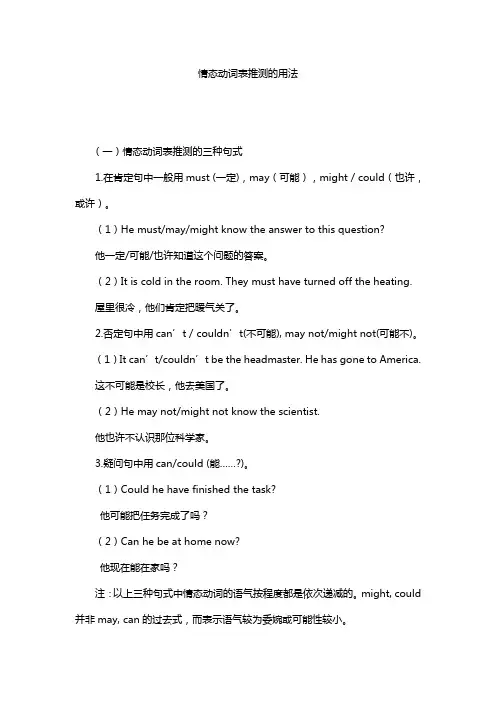
情态动词表推测的用法(一)情态动词表推测的三种句式1.在肯定句中一般用must (一定),may(可能),might / could(也许,或许)。
(1)He must/may/might know the answer to this question?他一定/可能/也许知道这个问题的答案。
(2)It is cold in the room. They must have turned off the heating.屋里很冷,他们肯定把暖气关了。
2.否定句中用can’t / couldn’t(不可能), may not/might not(可能不)。
(1)It can’t/couldn’t be the headmaster. He has gone to America.这不可能是校长,他去美国了。
(2)He may not/might not know the scientist.他也许不认识那位科学家。
3.疑问句中用can/could (能……?)。
(1)Could he have finished the task?他可能把任务完成了吗?(2)Can he be at home now?他现在能在家吗?注:以上三种句式中情态动词的语气按程度都是依次递减的。
might, could 并非may, can的过去式,而表示语气较为委婉或可能性较小。
(二)情态动词表推测的三种时态1.对将来情况的推测,用“情态动词 + 动词原形”。
(1)She must / may / might / could arrive before 5.5:00前她一定/可能/也许到。
(2)She must/may/might/could walk miles and miles among the hills without meeting anyone.她一定/可能/也许会在山里一连走好几英里而遇不到一个人。
2.对现在或一般情况的推测,用“情态动词 + be”,“情态动词 +be doing”或“情态动词 + 动词原形”。
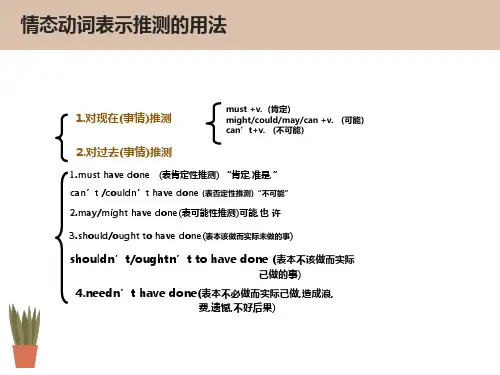
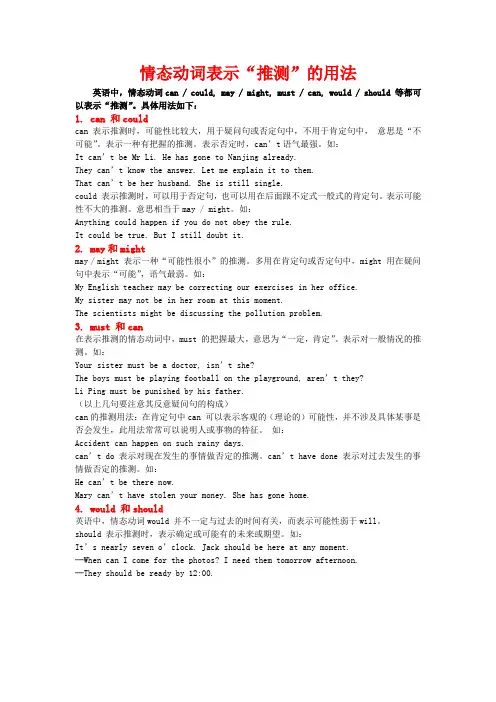
情态动词表示“推测”的用法英语中,情态动词can / could, may / might, must / can, would / should 等都可以表示“推测”。
具体用法如下:1. can 和couldcan 表示推测时,可能性比较大,用于疑问句或否定句中,不用于肯定句中,意思是“不可能”。
表示一种有把握的推测。
表示否定时,can’t语气最强。
如:It can’t be Mr Li. He has gone to Nanjing already.They can’t know the answer. Let me explain it to them.That can’t be her husband. She is still single.could 表示推测时,可以用于否定句,也可以用在后面跟不定式一般式的肯定句。
表示可能性不大的推测。
意思相当于may / might。
如:Anything could happen if you do not obey the rule.It could be true. But I still doubt it.2. may和mightmay / might 表示一种“可能性很小”的推测。
多用在肯定句或否定句中,might 用在疑问句中表示“可能”,语气最弱。
如:My English teacher may be correcting our exercises in her office.My sister may not be in her room at this moment.The scientists might be discussing the pollution problem.3. must 和can在表示推测的情态动词中,must 的把握最大,意思为“一定,肯定”。
表示对一般情况的推测。
如:Your sister must be a doctor, isn’t she?The boys must be playing football on the playground, aren’t they?Li Ping must be punished by his father.(以上几句要注意其反意疑问句的构成)can的推测用法:在肯定句中can 可以表示客观的(理论的)可能性,并不涉及具体某事是否会发生,此用法常常可以说明人或事物的特征。
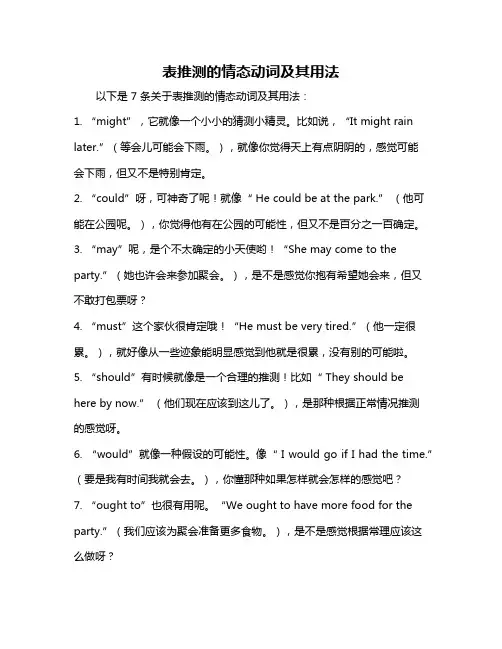
表推测的情态动词及其用法以下是 7 条关于表推测的情态动词及其用法:1. “might”,它就像一个小小的猜测小精灵。
比如说,“It might rain later.”(等会儿可能会下雨。
),就像你觉得天上有点阴阴的,感觉可能会下雨,但又不是特别肯定。
2. “could”呀,可神奇了呢!就像“ He could be at the park.” (他可能在公园呢。
),你觉得他有在公园的可能性,但又不是百分之一百确定。
3. “may”呢,是个不太确定的小天使哟!“She may come to the party.”(她也许会来参加聚会。
),是不是感觉你抱有希望她会来,但又不敢打包票呀?4. “must”这个家伙很肯定哦!“He must be very tired.”(他一定很累。
),就好像从一些迹象能明显感觉到他就是很累,没有别的可能啦。
5. “should”有时候就像是一个合理的推测!比如“ They should behere by now.” (他们现在应该到这儿了。
),是那种根据正常情况推测的感觉呀。
6. “would”就像一种假设的可能性。
像“ I would go if I had the time.” (要是我有时间我就会去。
),你懂那种如果怎样就会怎样的感觉吧?7. “ought to”也很有用呢。
“We ought to have more food for the party.”(我们应该为聚会准备更多食物。
),是不是感觉根据常理应该这么做呀?我觉得啊,这些情态动词让我们的表达更丰富、更灵活,能更好地传达我们心中那种不确定或者推测的感觉,真是太奇妙啦!。
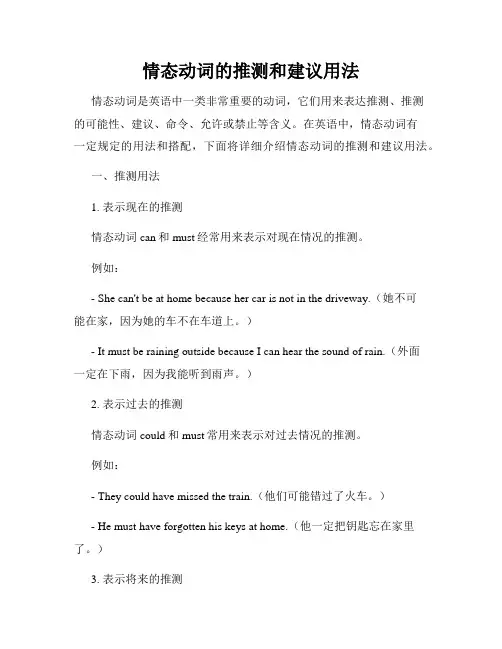
情态动词的推测和建议用法情态动词是英语中一类非常重要的动词,它们用来表达推测、推测的可能性、建议、命令、允许或禁止等含义。
在英语中,情态动词有一定规定的用法和搭配,下面将详细介绍情态动词的推测和建议用法。
一、推测用法1. 表示现在的推测情态动词can和must经常用来表示对现在情况的推测。
例如:- She can't be at home because her car is not in the driveway.(她不可能在家,因为她的车不在车道上。
)- It must be raining outside because I can hear the sound of rain.(外面一定在下雨,因为我能听到雨声。
)2. 表示过去的推测情态动词could和must常用来表示对过去情况的推测。
例如:- They could have missed the train.(他们可能错过了火车。
)- He must have forgotten his keys at home.(他一定把钥匙忘在家里了。
)3. 表示将来的推测情态动词will和might可以用来表示对将来情况的推测。
例如:- I think it will rain tomorrow.(我认为明天会下雨。
)- She might come to the party tonight.(她也许会来参加今晚的聚会。
)二、建议用法1. 表示劝告和建议情态动词should和ought to常用来表示劝告和建议。
例如:- You should see a doctor about your headache.(你应该去看医生治疗你的头痛。
)- They ought to study harder if they want to pass the exam.(如果他们想通过考试,他们就应该更努力学习。
)2. 表示必要性和建议情态动词need和have to常用来表示必要性和建议。
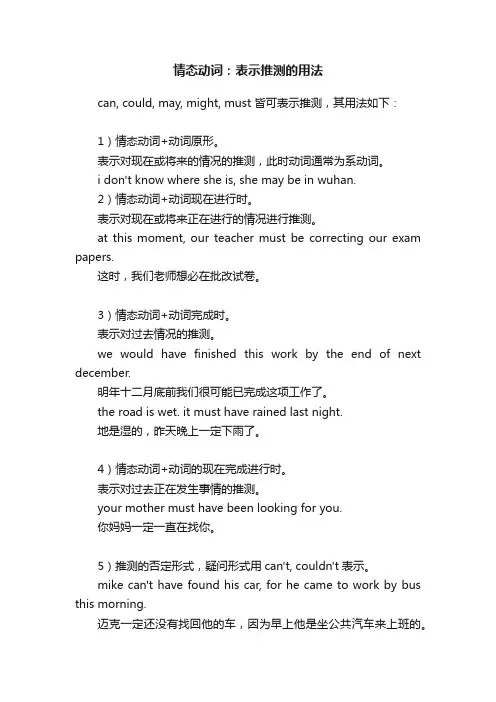
情态动词:表示推测的用法can, could, may, might, must 皆可表示推测,其用法如下:1)情态动词+动词原形。
表示对现在或将来的情况的推测,此时动词通常为系动词。
i don't know where she is, she may be in wuhan.2)情态动词+动词现在进行时。
表示对现在或将来正在进行的情况进行推测。
at this moment, our teacher must be correcting our exam papers.这时,我们老师想必在批改试卷。
3)情态动词+动词完成时。
表示对过去情况的推测。
we would have finished this work by the end of next december.明年十二月底前我们很可能已完成这项工作了。
the road is wet. it must have rained last night.地是湿的,昨天晚上一定下雨了。
4)情态动词+动词的现在完成进行时。
表示对过去正在发生事情的推测。
your mother must have been looking for you.你妈妈一定一直在找你。
5)推测的否定形式,疑问形式用can't, couldn't表示。
mike can't have found his car, for he came to work by bus this morning.迈克一定还没有找回他的车,因为早上他是坐公共汽车来上班的。
注意:could, might表示推测时不表示时态,其推测的程度不如can, may。
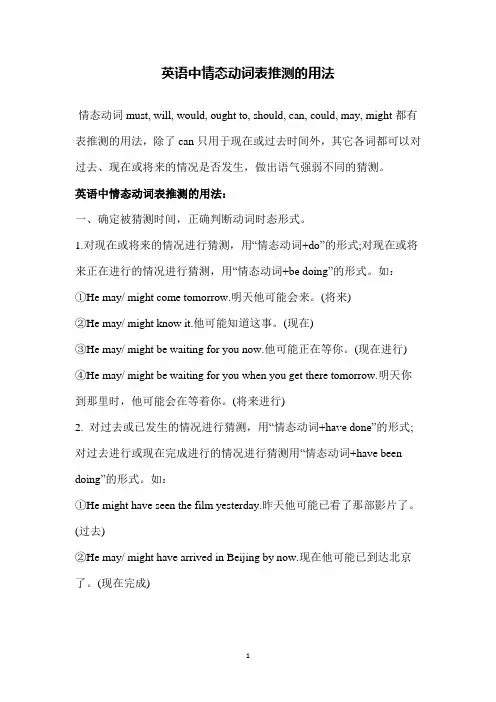
英语中情态动词表推测的用法情态动词must, will, would, ought to, should, can, could, may, might都有表推测的用法,除了can只用于现在或过去时间外,其它各词都可以对过去、现在或将来的情况是否发生,做出语气强弱不同的猜测。
英语中情态动词表推测的用法:一、确定被猜测时间,正确判断动词时态形式。
1.对现在或将来的情况进行猜测,用“情态动词+do”的形式;对现在或将来正在进行的情况进行猜测,用“情态动词+be doing”的形式。
如:①He may/ might come tomorrow.明天他可能会来。
(将来)②He may/ might know it.他可能知道这事。
(现在)③He may/ might be waiting for you now.他可能正在等你。
(现在进行)④He may/ might be waiting for you when you get there tomorrow.明天你到那里时,他可能会在等着你。
(将来进行)2. 对过去或已发生的情况进行猜测,用“情态动词+have done”的形式;对过去进行或现在完成进行的情况进行猜测用“情态动词+have been doing”的形式。
如:①He might have seen the film yesterday.昨天他可能已看了那部影片了。
(过去)②He may/ might have arrived in Beijing by now.现在他可能已到达北京了。
(现在完成)③He might have been waiting for you when you phoned him.你给他打电话时,他可能已在等你了。
(过去完成进行)二、把握猜测语气特点,选择恰当情态动词。
1. 熟记情态动词的语气特点和用法限制。
1)表示肯定的猜测时,各情态动词语气强弱如下:最强——must(一定)will (很有可能)would(很有可能)ought to(应该,很有可能)should(应该,很有可能)can(可能)could(可能)may(可能)最弱——might(可能)2)表示否定的猜测时can't / couldn't语气最强,指“不可能”;may / might not语气最弱,意思是“可能不”。
(一)情态动词表推测在英语中,表示对某件事物的确定程度,即表示推测的时候,我们通常会用到以下情态动词,must, might, could, may, can’t, couldn’t.用法:对现在事实的猜测:must/may/might+be (对现在情况的推测),must / may / might +be doing(对说话瞬间情况的推测)对过去事实的猜测:must/may/might+have been (对过去情况的推测)must/may/might +have done(对过去某时情况的推测)1)must表示我们对某事很有把握,从逻辑上看是必然的,它只能用于肯定的陈述句中。
在疑问句和否定句中,通常用can和can’t。
如:John said the professor must be at least seventy,but Peter t hought he couldn’t be as old as that.约翰说那位教授至少有70岁,但彼得认为他不可能有那样老。
2)may和might表示推测,may比might语气弱,might比may语气更弱,表示说话人对现在或将来不太确定的可能性的推测。
如:①He looks pale. He may be ill.他脸色苍白,可能病了。
②Tom might come here at nine, but I am not sure.3)can可用于否定和疑问句,can not表示“不可能”。
①can’t be+表语表示对现在情况的推测如:He can’t be her father; he is too young. 他不可能是她的父亲,他太年轻了。
②can’t have +过去分词表示对过去情况的推测。
如:He can’t have got the Chinese book.4)could的用法:could可以代替can,表示现在时间的动作,但语气较为婉转客气或更加不肯定。
英语情态动词的推测用法英语中的情态动词(modal verbs)是一类特殊的动词,用于表示说话者的态度、情感以及对发生事件的推测和猜测。
推测用法是情态动词的重要应用之一,在英语表达中起到了关键的作用。
本文将介绍英语情态动词的推测用法以及相应的例句,使读者能够更好地掌握使用情态动词进行推测的技巧与方法。
1. 可能性推测情态动词can和may经常用于表示对某件事情的可能性进行推测。
下面是一些例句:- It can/may rain this afternoon.(今天下午可能会下雨。
)- They can/may be at the cinema.(他们可能在电影院。
)- She can/may have forgotten her keys.(她可能忘记带钥匙了。
)2. 不可能性推测情态动词cannot和mustnot可用于表示对某事的不可能性进行推测。
以下是一些例句:- It cannot/mustnot be true.(这不可能是真的。
)- They cannot/mustnot have arrived yet.(他们不可能已经到达。
)- She cannot/mustnot have known about the event.(她不可能知道这个事件。
)3. 可能性和不可能性的推测情态动词might表示对某事的可能性进行推测;而情态动词maynot除了表示不可能性推测外,也可表示对某事的可能性进行推测。
以下是一些例句:- It might rain later.(可能会下雨。
)- They might not be home.(他们可能不在家。
)- She may not have finished her homework.(她可能没有完成作业。
)4. 应该性推测情态动词should用于表示一种合理的推测,表明按照常理或某些规定,某事应该发生或已经发生。
以下是一些例句:- They should be here by now.(他们现在应该到了。
情态动词表推测的五种情况1.can / could用于表推测的用法(1) 从使用句型上看,can 通常只用于否定句或疑问句,一般不用于肯定句,而could 可用于肯定句、否定句和疑问句。
两者没有时间上的差别,只是could 比can 更委婉,更不确定。
如:It can’t [couldn’t] be true. 那不可能是真的。
What can [could] they be doing? 他们会在干什么呢?We could go there this summer. 今年夏天我们可能要去那儿。
注:can 有时也用于肯定句中表示推测,主要用于表示理论上的可能性(即从理论上看是可能的,但实际未必会发生),或表示“有时”之意。
如:Even experienced teachers can make mistakes. 即使是有经验的教师也可能出错。
She can be very unpleasant. 她有时很令人讨厌。
(2) 从时间关系看,对现在或将来情况作推测,后接动词原形;对正在进行的情况作推测,后接be doing 结构;对过去情况作推测,后接动词完成式。
如:He could have gone home. 他可能已经回家了。
He can’t [couldn’t] have understood. 他不可能理解了。
Why does he know this? Can [Could] someone have told him about it? 他怎么知道? 会是哪个人告诉他了吗?(3) “could+完成式”除表示对过去的推测外,还有以下重要用法:①表示过去没有实现的可能性,常译为“本来可以”。
如:I could have lent you the money.Why didn’t you ask me? 我本来可以借这笔钱给你的。
你为什么不向我提出?②用来委婉地责备某人过去应该做某事而没有去做,常译为“本来应该”。
情态动词表示推测的用法
1、可能
「可能」就是表示可能性的,指的是事情出现的可能性较大,但还未确定的意思。
比如说:今天可能会下雨。
是一个怀疑的可能,但还没有确定,可以提出一种可能。
2、似乎
「似乎」表示一种推测,是指对事情认为可能出现,但尚未确定的思考概念。
比如说:他似乎可以来这里。
意思是认为他可能会来这里,但还没有确定。
3、大概
「大概」是表示可能性,指根据一定的经验和推测,有可能出现一定的情况,但是也不一定确定。
比如说:今天大概不会下雨。
表示根据其他的条件,今天的下雨的可能性不大,但是也无法确认。
4、或许
「或许」也表示可能性,指某件事情可能出现而可能又不出现,有可能发生。
比如说:明天或许会有暴风雨。
意思是有可能发生暴风雨,但也有可能不发生。
5、有可能
「有可能」也表示可能性,指某件事情可能会发生,也可能不发生的
意思。
比如说:你今天有可能会忙碌一整天。
这里暗示,你今天可能
会很忙碌,但也可能不会,由你的工作情况决定。
6、应该
「应该」是一种推测,指根据一定的情况和经验,推断出可能发生的
事情。
比如说:今天晚上应该比刚才冷多了。
这里暗示根据环境特点,晚上应该会比白天温度低很多,推测出有可能发生的情况。
7、大可
「大可」也表示可能性,也可以用于表示推测的情况,而且强调的程
度比较大。
比如说:今天大可能会下雨。
这里表示,根据一定的条件,有可能出现下雨的情况,尤其强调后续会出现相关现象。
情态动词表推测用法总结(一)情态动词表推测能用于表推测的情态动词:英语情态动词表推测的时态构成(1)语气部分:(以下情态动词语气由强至弱)肯定句:must、may、might(=could)否定句:can’t(=couldn’t)、mayn’t、mightn’t疑问句:can、could(语气更加委婉不确定)(2)时态部分:一般现在或一般将来时间的推测:情态动词+be;情态动词+v.对过去时间的推测:情态动词+have done对正在进行的时态的推测:情态动词+be doing(二)表许可、请求1、 can, could2、may, might3、must4、shall5、will, would1. can, could1) 用在疑问句中,表示一般的请求。
两者不同在于:用could 要比用can更加委婉,特别是没有把握得到允许时。
Can I go with you? 我能和你一起去吗?Could I ask you something? 我能问你一个问题吗?2) 用在陈述句中,表示许可:You can leave when you finish your work. 做完事情后你才可以走。
2. may, might1) may用在疑问句中,也表示一般的请求。
同can相比,may比较正式,常常表示尊敬之意。
并且,may在疑问句中常用于第一人称,很少有May you…/they…这样的句型。
Might比较少用在疑问句中,它表示请求的时候常用陈述句。
May I make a suggestion? 我可以提个建议?2) 用在陈述句中,表示许可,此时与can, could相近。
You may have a rest before we set out again. 我们再次出发之前你可以先休息一下。
3. must1) 表示说话人“不许”和“禁止”某人做某事,有很强的劝告语气。
Cars must not be parked here.此地不准停车。
第五单元:情态动词表示推测的用法
一,对不同时态的推测
情态动词+do sth表示对现在事情的推测。
情态动词+be doing sth表示对正在发生的事情的推测。
情态动词+have done sth表示对过去或已完成的事情的推测。
如:
1、They must be in the classroom now.
他们现在一定在教室里。
2、The light in the teachers’ office is still on. Miss Gao must be working.
老师办公室的灯还亮着,高老师肯定正在工作着。
3、Mike may (might) hurt in the traffic accident.
迈克可能在这次交通事故中受了伤。
4、He must have finished his homework yesterday.
他昨天肯定完成了作业。
二、情态动词表示推测,在不同句型中的用法:
1、在肯定句中,可使用的情态动词有:must, could, may, might,等;其肯定程度逐渐减弱,must表示一种很有把握的推测,意为“一定,肯定”,could/may/might表示一种不太有把握的推测,may意为“可能”,might意为“或许”could意为“可能”,could/may/might在表示推测时,无时态区别,只表示语气差异。
如:
(1)You have worked all this week .You must be tired.
你辛苦工作了一周,一定累坏了。
(2)Will you please answer the phone? It could /may/might be your mother.
请接一下电话好吗?可能是你的母亲打来的。
(3)According to the radio ,it may/might/could rain this evening.
根据广播,今晚可能下雨。
2、在否定句中使用can’t和may not/might not. can’t表示很有把握的否定推测,意为“不可能”;may not/ might not 表示不太有把握的否定推测,意为“可能不”如:(1)She can’t be at school .It’s Sunday today.
她不可能在学校,今天是星期天。
(2)She may not be there today.
今天她可能不在那儿。
(3)I think he might not come.
我认为他可能不来了。
3、在疑问中,一般只用can或could,意为“可能”如:
(1)Who can it be at the door ?Can it be Tom?
门口会是谁呢?会不会是汤姆呢?
(2)Where could it be?
它可能在哪儿呢?
三、在表示推测时,反意疑问句的两种情况;
1、对现在进行推测时,反意疑问句中的动词用一般现在时。
如:
(1)He must be good at English, isn’t he?
(2)You might be watching TV at home ,aren’t you?
2、对过去进行推测时,若有明确的、表示过去的时间状语,反意疑问句中的动词用过去式;若没有明确的、表示过去的时间状语,反意疑问句中的动词用现在完成时。
如:(1)It must have rained last night , didn’t it?
(2)You might have been to the Great Wall, haven’t you?
附:belong to的用法
belong to 是动词+介词构成的短语,它表示所属关系,注意其用法:
1、后接某人或某单位名词时,表示某物归属于某人或某单位,这时belong to意为“属
于,为…所拥有”;后接某个家庭,团体、党派、组织、国家等名词时,表示“为…之一成员,与…相关。
”
2、它不能用于进行时态,也不能用于被动语态,其主语通常为某物,后常接名词或人称代词的宾格形式,不能接名词性物主代词或名词所有格形式,如:
(1)这台电视机属于谁?
Who does this TV set belong to?
(2)这间房子下个月将属于我。
The house will belong to me next month.
(3)这辆小汽车是那家医院的。
The car belongs to that hospital.
(4)我是这个游泳俱乐部的成员。
I belong to this swimming club.
(5)她曾经是中国女排的队员。
She belonged to the Chinese Women’s Volleyball Team.
(6)你属于哪个党派?
Which Party do you belong to?
(7)中国是一个发展中国家,属于第三世界。
China is a developing country belonging to the Third World.
另外,应注意belong to可和名词性物主代词或名词所有格相转换。
如:
1、The car belongs to me .
→The car is mine.
2、The new bike belongs to Mike.
→The new bike is Mike’s.
I’m really anxious……
anxious意为“忧虑的;焦虑的,不安的;渴望的;急切希望的”,其后可接about或for,表示“担心……,焦虑……”;还可接动词不定式或that从句。
如:
1、飞机突然起飞的时候,我感到非常的焦虑不安。
I was very anxious when the plane suddenly took off .
2、他非常担心他儿子的健康。
He is anxious about / for his son’s health.
3、这位母亲非常担心她的孩子们的安全。
The mother was very anxious about the safety of her children.
4、他渴望很快见到你。
He is anxious to meet you soon.
5、她渴望拥有一辆自己的自行车。
She is anxious to have a bike of her own.
6、她非常渴望能在大学毕业之后找到一份好工作。
She is anxious that she can get a good job after graduating from university.
I think I dropped it ……
比较“落下、掉下”的drop 和 fall
drop可指偶然地丢掉、落下,也可以指有意而为地丢下,多用作及物动词,后直接跟宾语,有时也可作不及物动词。
fall多指地球引力所导致的下落或失去平衡的跌落、掉下,是不及物动词。
如:
1、She dropped her glasses and broke them.
2、I dropped the letter in to the postbox.
3、The box fell from the table to the floor.
4、The leaves fall in autumn.
5、The ripe fruit fell/dropped from the tree.
6、Don’t drop the ball on the ground .It’s made of glass.。